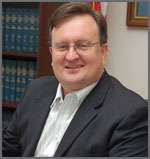By Kevin Jeffries, Riverside County Board of Supervisors (First District).
Transparency and public access to our government is a core value of our political system, and access to meetings, deliberations, and decisions of local government bodies in California is protected by the Brown Act, the Public Records Act, and a variety of other rules and regulations passed by the State Legislature through the years (while curiously almost always exempting themselves). These rules are critical to the operation of a free press and to having an informed electorate.
Unfortunately, many of those “open” meetings in Riverside County and around the state take place during the workday, when it is difficult for residents to attend, especially those who are employed or have children they are raising at home. In a county the size of Riverside, it can take an hour to get to the County Administrative Center, and three hours to travel from Blythe, making a visit to attend a meeting when one is only interested in a single agenda item very inconvenient.
The Riverside County Board of Supervisors has historically tried to mitigate that difficulty by making our own Board meetings and workshops available to the public via live streaming online, and on local cable channels, as well as keeping archived videos of meetings available on the county’s website to watch later. But not every governmental agency or commission composed at least in part of Supervisors or their appointees follows this example, including such organizations as the Planning Commission (hearing proposals for large commercial and residential developments), the Riverside County Transportation Commission (responsible for billions of dollars in infrastructure), and the Riverside Conservation Authority (who manages thousands of acres of habitat).
Not having groups like this make their meetings available online is not only an inconvenience to the public and the press, but to Supervisors and staff as well. Having staff members sit through a three hour meeting while waiting for a single item of interest to our district to be heard is a very inefficient use of our limited resources, but allowing us to listen in from our offices can make a day far more productive than it would be sitting in the Board Room.
Our Board of Supervisors has already invested in the necessary audio-visual equipment in the Board Room utilized by many of these agencies and commissions, enabling them to live stream their meetings without any additional staffing or hardware needs.
At our last Board Meeting, we passed a reform requiring that within six months of passage of this proposal, any governmental agency or commission which is 1) Bound by the Brown Act, 2) Consists in whole or in part of members of the Board of Supervisors or their appointees, and 3) Wishes to use the CAC Board Room for their meetings, be requested to allow county staff make their meetings available online to the public as part of their agreement to use the chambers.
Because the equipment, staffing, and technology exists already in the Board Room, the only start-up cost to these agencies of this new requirement to begin broadcasting their meetings would be to modify their webpages to create a link to the videos of meetings. Any costs for streaming access to the network would be borne by the County as part of the operations costs of the Board Room itself—a very incidental cost that is worth bearing by the County in the name of openness and transparency.
Some of my colleagues on the Board were concerned that an outright mandate for these agencies and commissions to broadcast their meetings was a bit too heavy handed, especially since they largely consist of other elected officials at the local level. In the end, we passed a compromise as laid out above, wherein each agency or commission will be officially asked by the County to make their meetings available online, rather than requiring it. While I would have preferred to simply make it a condition for using the Board Room, it will be very interesting to see which, if any, public agencies or commissions would reject such an offer to make these meetings available at no cost to themselves.
You might even say that politically speaking, it’s an offer they really can’t refuse.
[divider] [/divider]
 Kevin Jeffries was elected in November 2012 to represent the residents of the 1st Supervisorial District, which includes about 2/3 of the City of Riverside, as well as Lake Elsinore, Wildomar, and Canyon Lake, and unincorporated communities such as Temescal Valley, Mead Valley, Lake Mathews, Good Hope, Lakeland Village, DeLuz, LaCresta, and Tenaja. A resident of Riverside County since 1971, Kevin is a successful local small business owner and served 29 years as a volunteer firefighter and six years in the State Assembly.
Kevin Jeffries was elected in November 2012 to represent the residents of the 1st Supervisorial District, which includes about 2/3 of the City of Riverside, as well as Lake Elsinore, Wildomar, and Canyon Lake, and unincorporated communities such as Temescal Valley, Mead Valley, Lake Mathews, Good Hope, Lakeland Village, DeLuz, LaCresta, and Tenaja. A resident of Riverside County since 1971, Kevin is a successful local small business owner and served 29 years as a volunteer firefighter and six years in the State Assembly.





